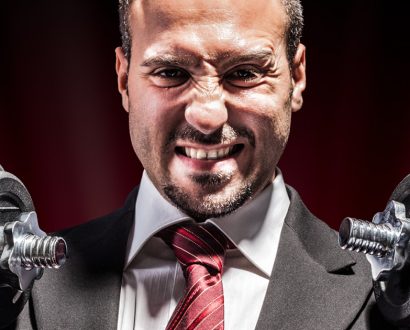How top CEOs benefit from fitness with a positive mindset

As a CEO, the demands on your time, energy and mental capacity are unlike any other. Managing teams, scaling businesses, navigating financial landscapes – it’s relentless. While many executives focus on strategy, finance and leadership, they often overlook a powerful tool that can sharpen their edge: fitness.
Incorporating regular exercise into your daily routine doesn’t just improve your physical health, it enhances cognitive function, builds mental resilience and bolsters leadership skills. Whether it’s a quick workout between meetings or a regular training regimen, the benefits of fitness for CEOs are profound, both personally and professionally.
Mental clarity and decision-making
Running a company means constantly making decisions that could impact the entire business. Whether you’re deciding on a new strategy, a critical hire or navigating a crisis, mental clarity is essential. Regular physical activity has been shown to improve cognitive function, memory and decision-making capabilities.
Why does this happen? Exercise increases blood flow to the brain, boosting the delivery of oxygen and nutrients to the areas that control thinking, decision-making and problem-solving.

CEOs who engage in regular exercise often report sharper focus, quicker problem-solving skills and an overall improvement in mental clarity.
According to Harvard Medical School, regular aerobic exercise, such as running or cycling, can actually increase the size of the hippocampus, the part of the brain responsible for memory and learning.
CEOs who engage in regular exercise often report sharper focus, quicker problem-solving skills and an overall improvement in mental clarity. For leaders navigating high-stakes environments, the mental edge gained through fitness can be the difference between success and stagnation.
Stress management
Let’s face it – being at the top of the corporate ladder comes with immense stress. Managing employees, stakeholders and shareholders, while dealing with the pressures of growth and competition can push even the most resilient leaders to their limits. Chronic stress is linked to numerous health issues, including cardiovascular diseases and impaired cognitive function.
Physical activity is one of the most effective ways to combat stress. Exercise releases endorphins, the brain’s natural mood lifters, which help reduce feelings of anxiety and depression. It also reduces the production of stress hormones like cortisol. For a CEO juggling constant pressure, regular workouts act as a natural stress reliever, helping to maintain a calm and focused demeanor when it’s needed most.
Physical activity is one of the most effective ways to combat stress.
Research backs this up: A study published in the Journal of Sports Science and Medicine shows that individuals who engage in regular physical activity report lower levels of perceived stress and better stress management.
For CEOs, this translates into enhanced performance under pressure, better emotional regulation and improved team leadership during challenging times.
The CEO’s superpower
Fitness isn’t just about physical strength; it builds mental toughness – a crucial trait for leaders. The grit and resilience required to push through a tough workout mirror the discipline needed to lead a company through turbulent times. Whether it’s powering through a challenging project or bouncing back after a business setback, resilience is a CEO’s superpower.
Regular training helps CEOs develop a positive mindset. The process of setting fitness goals, working toward them and overcoming physical limitations builds a mental framework that translates into business.
Many high-profile CEOs, such as Richard Branson and Jeff Bezos, attribute their ability to lead successfully to the discipline and resilience built through fitness.
This resilience allows leaders to face business challenges head-on, stay persistent when the going gets tough, and maintain focus on long-term goals despite short-term obstacles.
Consider it this way: when you train your body to withstand physical challenges, you’re also training your mind to endure mental challenges. Many high-profile CEOs, such as Richard Branson and Jeff Bezos, attribute their ability to lead successfully to the discipline and resilience built through fitness.
Increased energy and productivity
It’s no secret that CEOs are often running on tight schedules with little room for downtime. Long days, endless meetings and constant travel can take a toll on energy levels. However, paradoxically, regular exercise – despite being physically demanding – boosts energy.
Exercise improves the efficiency of your cardiovascular system, ensuring better circulation of oxygen and nutrients throughout the body. This results in increased energy and endurance, which help CEOs maintain high productivity levels throughout the day.
More energy means more focus, more productivity and the ability to lead at a high level consistently.
The Mayo Clinic reports that regular physical activity increases overall energy and reduces fatigue. For executives who need to be ‘on’ from morning until night, the increased stamina provided by fitness is invaluable.
More energy means more focus, more productivity and the ability to lead at a high level consistently.
Leading by example
As a CEO, you set the tone for your organization. When you prioritize health and fitness, you’re not only improving your own wellbeing but also modeling a behavior that encourages a healthier, more productive workforce.
When the leadership prioritizes wellness, the ripple effect can significantly impact company culture, morale and performance.
Employees look to leaders for cues on how to balance their lives. CEOs who demonstrate a commitment to fitness inspire their teams to do the same, creating a corporate culture that values health, wellness and balance.
In fact, organizations led by health-conscious CEOs often report lower absenteeism, higher employee engagement and improved overall productivity. When the leadership prioritizes wellness, the ripple effect can significantly impact company culture, morale and performance.
Incorporate fitness into your busy life
1. Schedule workouts like meetings: Just like you wouldn’t cancel a meeting with a client, don’t cancel your workout. Block time in your calendar and treat it as non-negotiable.
2. Find your fitness ‘why’: Understand why fitness matters to you. Whether it’s mental clarity, stress relief or setting an example, knowing your ‘why’ keeps you motivated.
3. Start small, stay consistent: You don’t need to train for hours a day. Even 30 minutes of moderate exercise can yield significant benefits. Focus on consistency over intensity.
4. Leverage corporate wellness programs: If your company doesn’t already have one, consider starting a wellness initiative. It can boost productivity, reduce healthcare costs and improve overall morale.
5. Track your progress: Use tools like fitness apps or wearables to monitor your activity, sleep and recovery. Tracking helps you stay accountable and ensures you’re making progress.
Fitness is not just about staying in shape; it’s about becoming a more effective leader. From improving mental clarity and managing stress to building resilience and boosting energy, the benefits of regular physical activity for CEOs are profound. As a leader, your performance at work is directly influenced by how well you take care of your body and mind.
Incorporate fitness into your daily routine and watch as it transforms not only your physical health but also your leadership, decision-making and overall success. The strongest CEOs don’t just lead – they live with energy, focus and resilience.